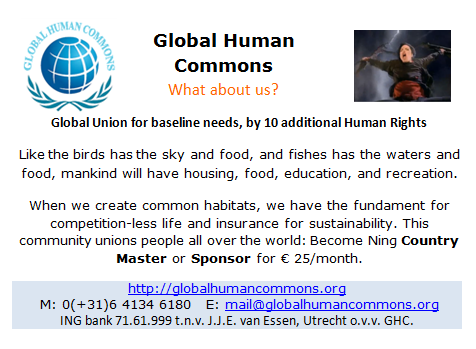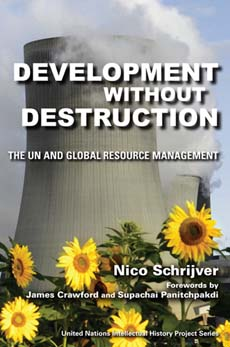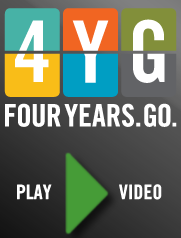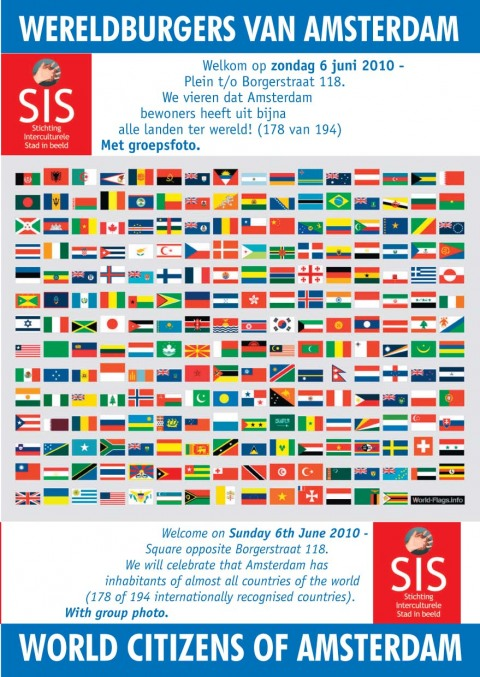

Global Human Commons
What about us?

Global Union for the baseline needs for Life and Wealth
Coalitions and cooperations:
- All Win Network
- ARINA
- Be Commons
- Centre for Global Negotiations
- COMMONS CAMPUS
- Development4all
- E2Us
- Essence Admin
- Essence Sum
- Global Commons Trust
- Inst. for Planetary Synthesis
- Kosmos Journal
- One Childs Village
-
P2P Foundation
- Recyclus
- Share the World’s Resources
- StarrPort
- Summit Speak,
- Trees Have Rights Too
- URSULA
- VipCure
- Wiser Earth
- World Citizens Action
- Association of World Citizens
- Yours to? Mail us your URL!
Managing natural resources and promoting sustainable development:
"This timely study makes a seminal contribution to understanding the management of natural resources in the context of changing economic, environmental, and social realities. . . . Schrijver's work shows how research undertaken by the UN is contributing to the search for solutions to today's main challenge: safeguarding the global commons for tomorrow, while providing a decent quality of life for all." —Supachai Panitchpakdi, Secretary-General of the UN Conference on Trade and Development
"Schrijver's thorough account of the achievements of the UN across the field of natural resource management enables him both to assess that contribution and to make realistic, practical suggestions for improvement." —James Crawford, University of Cambridge.
This community unions people all over the world to create the next step in society building, conscious development, and global evolution: When we create common habitat, we will have the fundament for competition-less life time and has insurance for sustainability, peace, and good living.
Of course we have to maintain, harvest, produce, and distribute. And we need to have the right to competition and capitalize on not basic rights and needs as luxury and want to haves. So we will. But not out of hunger, poverty, or survival. Not as slaves or financial dependents.
How to create this? We can and will share our wisdom, funds, assets, time, and labor. I will honor the people who came up with this idea, and ask all human beings to join and support this union.
Commons Course: Operationalizing Sustainability
Hello Friends Around the World, thought you might be interested in participating in the next Common Course online. There will be a short introductory conference call.
I am putting this out to people i know who are working towards sustainability and justice in various fields. I think you will find that the commons movement provides means to operationalize sustainability and enable transparency, sharing and justice in ways that have not been possible until recent times.
Outreach and development for the Common Course is through the Commons Knowledge Alliance and Commons Action for the UN. Common Courses will soon be available for universities and organizations around the world via creative commons licensing.
You can learn quite a bit about the 4 week intensive course and see the curriculum by following the links below. The course is open to anyone. Please share this with anyone who you think may be interested... those working towards human rights, rights of nature and sustainability.
The Common Course is now open for enrollment. A short introductory conference call is offered.
Click here to find out more details of the new Common Course.
Below you’ll find an overview of what will be offered during this Common Course curriculum.
Hope to have your participation,
Mary Beth Steisslinger, MS
For the Common Course Team
The Common Course - an Overview
The full Common Course Curriculum
Sponsors: The Anthroposphere Institute, The Commons Knowledge Alliance
Format:
1. Self-study; materials available on-line
2. Regular participation in on-line discussion group (minimum of 3x/week)
3. Participation in weekly conference call
Academic Director: Leo Burke
Online Discussion Facilitators: Leo Burke, Robin Temple, Mary Beth Steisslinger, Jay Bender
Webmaster: Robin Temple
Tuition: $25 for participants from OEDC countries; $5 for participants from non-OEDC countries
Website: The Commons Campus
Materials: All text materials will be posted on the website in PDF format; audio materials in MP3 format; videos in YouTube format (.flv)
Course orientation conference call: Saturday, 29 January, 2011.
This orientation conference call will be the official start of the Common Course.
The orientation call will give you a chance to be introduced to your instructors on the Common Course, hear from others who are also participating, and ask any technical questions you may have about using this online learning platform for the course.
Topics:
Week I—Introduction to the Commons
Overview of the commons, including history, current usage and definitions. Major issues facing the commons today.
Week II: The Enclosure of the Commons
History of the enclosure process. Current attempts at enclosure, privatization, monetization of the commons.
Week III: The Commons and Climate Change
The impact of climate change on the commons and the use of commons trusts to protect the climate.
Week IV: The Depth and Breath of the Global Commons: From Philosophy to Action
Examining the philosophical underpinnings of the global commons and looking at ways of taking effective action to create a sustainable future.
Common Course Working Group
globalcommons@gmail.com
~ ~ ~
THE COMMONS, n., gifts of nature and society; the wealth we inherit or create together and must pass on, undiminished or enhanced, to our children; a sector of the economy that complements and counterweights the corporate sector.
~ ~ ~
From: Glans Van Essen <glansvanessen@yahoo.com>
To: jvhuffines@gmail.com
Cc: chavezm@un.org; Lisinka Ulatowska <lisinka.ulatowska@gmail.com>
Sent: Thu, August 5, 2010 2:59:21 PM
Subject: Fw: Action: DPI-NGO Conf. on Commons
To Jeff Huffines,
Chair of the NGO/DPI Executive Committee,
Global Human Commons is an initiative of ing. Emile van Essen, member of The Association of World Citizens which is accredited to the United Nations via the ECOSOC Roster:
- Requesting that the 2012 DPI/NGO conference be dedicated to the global commons and possibly be held in Macau.
- Pointing to the official UN Document with the IPS submission, E/2010/NGO/29 and mention attached letter will help to address today's challenges.
- Please find our main ideas outlined in the attached letter. (Letter)
Kind Regards,
Global Human Commons
ing. J. J. Emile van Essen
www.globalhumancommons.org
emile@globalhumancommons.org
Mobile (+31)641 346 180, Fax (+31)842 239 010
Arnodreef 58, 3561 GN UTRECHT, The Netherlands
Common Course, 2010, Oct17-Nov13
This is your invitation to participate in the Common Course, Oct 17 - Nov 13.
Commons Action for the United Nations, Anthroposphere Institute, Global Commons Trust and ECO-Singapore would like to invite you to participate in this free, on-line Common Course, and ask for your help in outreach to others who may find this course transformative for their work as individuals, NGO's, government representatives or business leaders.
On-line, free and flexible enough for any schedule -- The Common Course lasts for four weeks. Readings and videos are posted* at the start of each week. On-line discussion and resource sharing areas are created thru the expressed interest/work focus of participants.
Those preparing for COY6, COP16, KlimaForum and other climate and energy related efforts are especially encouraged to participate (... commit to take the Common Course as part of the 10-10-10 challenge to build awareness for coordinated climate action by people around the world!)
* For those in areas with signal- or internet connection challenges, course materials can be emailed to you directly, and your questions and feedback will be added to the forums online. Course facilitators are committed to making the Common Course accessible to all. We ask for your help in making this happen.
From: Lisinka Ulatowska <lisinka.ulatowska@gmail.com>
To: Mr. J. Huffines <jvhuffines@gmail.com>
Cc: Doug Mattern <info@worldcitizens.org>; Glans Van Essen <glansvanessen@yahoo.com>
Sent: Thu, August 5, 2010 4:53:04 PM
Subject: Global Commons,the DPI NGO Conference and briefings
Dear Mr. Huffines,
Ir. Emile van Essen, who heads the Global Human Commons for us recently wrote to you regarding the global commons as topic for the 2012 NGO DPI conference. As U. N. Representative of the Association of World Citizens and upon request of our President, Doug Mattern, I should like to support this request and expand on our reasons for proposing the Global Commons as a fruitful subject for:
- an NGO Briefing in the not too distant future; and
- the subject for the 2012 DPI NGO Conference (possibly to be held in Macao?)
In this context, we would like to draw your attention to the attached UN document on the global commons.
The global commons is important because it embraces three aspects:
- commons goods, those aspects of nature and society inherited by all people that must also be passed on to succeeding generations,
- the well-being of all people and of nature as a whole, and
- local, national and international governance structures that allow all people both to have a say in how these are stewarded and to draw the benefits from them
The global commons approach to the solution of world problems is being used by some of the most eminent thinkers of today. Elinor Ostrom received the Nobel Peace Prize for her work in this area. Jeremy Rifkin suggests that applying this approach to the energy crisis might be the only way to achieve results in time. Global networks of organizations, such as Geo Cities, Eco Cities, Transition Towns are using it to deal with global crises in the areas of energy, the environment, the economy and social relations that are now confronting the whole of humanity. Wikpedia, U Tube, U Tunes and many other initiatives show the success of a commons approach when it comes to democratizing access to information and culture.
These initiatives evidence also the existing trend: from large-scale problem solving by those in power to problem solving by large networks of people. This trend is a vital component when it comes to the United Nations mandate to build, make, and keep the peace. The United Nations has the task to help sovereign Member States, each with a limited jurisdiction and individual needs, to deal with crises that affect the survival of all human beings. Here the partnerships between the UN System and civil society are an essential element without which UN Member States can not come to grips with global crises.
The crises in the areas of the economy, energy and the environment are an accumulation of the actions of ordinary people worldwide and therefore also must be solved by people everywhere, working together. Responsibility must be born by all and benefits derived for all if humanity is to thrive, as is attested to in the Universal Declaration of Human Rights, the Earth Charter, and many other normative documents.
Both a UN Briefing and a DPI NGO Conference would be well-suited to help civil society to work more closely together to further the endeavours of the United Nations.
With thanks for all you do for the NGO Community,
Dr. Lisinka Ulatowska, UN Representative for the Associations of World Citizens
HLS: Implementation Challenges & Opportunities for Themes of Current Cycle, 13 May 2010
We have reached a stage in history where words can no longer substitute for action. 20 years after the Rio summit, and 10 years after the message was reaffirmed in Johannesburg, ecological and social trends are still worsening. Democratically-elected governments, ostensibly accountable to their citizens, have not kept their promises and commitments. Today we are asking that they assume their solemn responsibilities and begin immediate and effective action.
Sustainable consumption and production is the material heart of sustainable development. It is not just another overarching theme; it is the mainstay of the framework that will enable us to meet the consumptive needs of all, as articulated in the MDGS, within the ecological carrying capacity of the planet.
The WSSD called on the international community to support the work being done at the regional and national level through a ten-year framework of programs. Indeed, many great, innovative initiatives and strategies to accelerate this shift to sustainability already exist, and would benefit from coordinated support, including financial support.
We would like to suggest a key possible program based on discussions thus far:
It is necessary to reform national accounting and develop new measures of economic progress that incorporate well-being and welfare. Agenda 21 is clear on this point, and we need an international program which draws on the work already being done on new sustainability indicators and on measures of progress, for example the Beyond-GDP exploratory work.
We support statements by several delegations including Finland, Barbados, Indonesia, and Switzerland, among several others, for the Marrakech Process to continue and to be formalized within the CSD process. We support discussion on format and substance of the 10 Year Framework of Programmes and wish them to be open and all-inclusive going forward to CSD 19.
In addition, we would like to emphasize the following tools for change:
Firstly, green, or sustainable, public procurement is fundamental and a key leverage point to help transform patterns of consumption and production. Green procurement also demonstrates government commitment to this transformation.
Secondly, we remind delegates of the critical role of education for sustainable consumption and production, which is at present fragmented, weak, and in many cases absent from learning situations. We call for governments to focus on education for sustainable consumption and production on all levels, and for people of all ages.
Finally, NGOs are disappointed to see that mention has not yet been made in this session of the UN Guidelines for Consumer Protection, in particular section G on sustainable consumption. Many governments have yet to apply the Guidelines, or in some cases even familiarize themselves with them.
To conclude, we call on Member States to commit to concrete action on this urgent area of production and consumption, with clear timelines for delivery. This must include, inter alia, comprehensive programmes of support. Therefore, we call on this Assembly to commit to the effective and formal integration of the Marrakech Process into the CSD structure.
4 papers by Mary Beth Steisslinger:
- Commons and Climate Change;
-
Multilateral Systems;
- Paradigm Comparison;
- Reclaiming the commons.
Projects:
- THE EARTH CHARTER
- UNPA Campaign
- 1We



